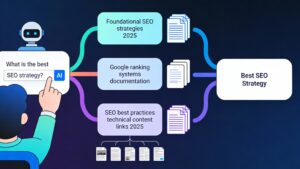For new to medium-sized websites with low or no authority, the importance of XML sitemaps in SEO has been greatly exaggerated. While sitemaps can be beneficial in certain scenarios, they are far from essential for most websites, especially those just starting out or with limited authority.
SEO is a System, not a checklist!
Ask any new to mid-level SEO what an SEO checklist should include – as often is the case on Reddit – and everyone will tell you that you need a sitemap but:
Table of Contents
ToggleGoogle’s Stance on Sitemaps
According to Google’s SEO Developer Guide on sitemaps are not always necessary.
Google states:”If your site’s pages are properly linked, Google can usually discover most of your site. Proper linking means that all pages that you deem important can be reached through some form of navigation, be that your site’s menu or links that you placed on pages”
This clearly indicates that for well-structured websites with proper internal linking, a sitemap is not crucial for Google to crawl and index your content.
The Reality of Sitemap Crawling for New Sites
For new domains or sites with low authority, Google’s interaction with your sitemap is minimal:
- Infrequent crawling: Google may only check your sitemap once a month or even every two months
- Limited crawling scope: Google will primarily crawl pages or documents that have authority
Watch the XML Sitemap Myth Video
The Authority Dilemma
A critical point to consider is the authority of your sitemap itself:
- What’s linking to your XML Sitemap?
- Are you building links to your feed.xml or feed.rss files?
If the answer is no, then your sitemap has little to no authority, and consequently, it’s not providing any authority to the pages listed within it
The Misconception of SEO Checklists
It’s a common misconception that having a sitemap, no 404 errors, and meta-descriptions under 250 characters automatically equates to good SEO. This checklist mentality is misleading. As stated in the query, “Google doesn’t care. There’s no ‘score’ or bonus points for doing 15/15 checklist items”
When Sitemaps Can Be Useful
While not essential for most sites, sitemaps can be beneficial in specific scenarios:
- Large websites with numerous pages
- Websites with non-spiderable content
- New websites that need to submit changed pages for indexing
- Recently relaunched websites
The Importance of Internal Linking
Instead of relying on sitemaps, focus on creating a solid internal linking structure. This not only helps users navigate your site but also allows search engines to discover and understand your content hierarchy naturally.
Conclusion
For new to medium-sized websites with low or no authority, investing time and resources into creating and maintaining a sitemap may not yield significant SEO benefits. Instead, focus on:
- Creating high-quality, valuable content
- Developing a strong internal linking structure
- Building a real online profile with genuine backlinks to increase your site’s authority
Remember, SEO is a holistic system, not a checklist. As your site grows in authority and complexity, you can always add a sitemap later if needed. But for now, your efforts are better spent on creating great content and building your site’s authority through other means.





